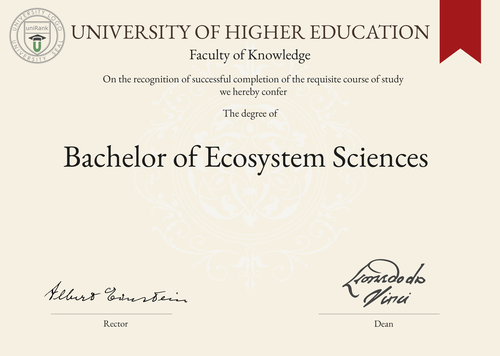
Bachelor of Ecosystem Sciences (BES)
Guide to Bachelor of Ecosystem Sciences Program/Course/Degree
Bachelor of Ecosystem Sciences (BES)

Program Name:
Bachelor of Ecosystem SciencesProgram or Degree abbreviation:
BESDuration range:
The duration of the Bachelor of Ecosystem Sciences program can vary depending on the country or university. Typically, it ranges from 3 to 4 years.Tuition range:
The tuition fees for the Bachelor of Ecosystem Sciences program can vary depending on the country or university. The range can vary from affordable to expensive, depending on the location and reputation of the institution.Overview:
The Bachelor of Ecosystem Sciences program is designed to provide students with a comprehensive understanding of ecosystems, their components and their interactions. This interdisciplinary program combines elements of biology, ecology, environmental science and sustainability to equip students with the knowledge and skills necessary to address complex environmental challenges.Curriculum Overview by year:
The curriculum of the Bachelor of Ecosystem Sciences program is structured to provide students with a strong foundation in ecological principles and their application. The program typically includes courses in ecology, biodiversity, conservation, environmental management and sustainability. In the later years, students may have the opportunity to specialize in areas such as ecosystem restoration, climate change, or wildlife management.Key Components:
The key components of the Bachelor of Ecosystem Sciences program include: - Understanding ecological principles and processes - Studying biodiversity and conservation - Learning about environmental management and sustainability - Gaining practical fieldwork and research experience - Developing critical thinking and problem-solving skillsCareer Prospects:
Graduates of the Bachelor of Ecosystem Sciences program can pursue various career paths in both the public and private sectors. Potential career prospects include: - Environmental consultant - Ecologist - Conservation scientist - Wildlife biologist - Environmental policy analyst - Sustainability officerSalary Expectations:
The salary expectations for graduates of the Bachelor of Ecosystem Sciences program can vary depending on factors such as job location, industry and level of experience. Generally, entry-level positions in this field offer competitive salaries, with the potential for growth as professionals gain more experience and expertise. For a more accurate understanding of salary expectations, you can utilize the Job Sites Search Engine, from our sister site jobRank, which searches over 4,600 job sites worldwide. Make sure to specify not only the job title but also the country you are interested in.Conclusions:
It is important to note that the duration, tuition fees, curriculum, key components, career prospects and salary expectations of the Bachelor of Ecosystem Sciences program can vary depending on the country or university chosen for study. Prospective students are advised to research and compare different institutions to find the best fit for their academic and career goals. Visitors can search for where this specific degree, Bachelor of Ecosystem Sciences, is offered anywhere in the world through the uniRank World Universities Search Engine.World Universities Search Engine
search for Bachelor of Ecosystem Sciences (BES) and add the Location (country, state etc.) or specific University you are interested in studying at.
Query examples:
- Bachelor of Ecosystem Sciences (BES) United States
- Bachelor of Ecosystem Sciences (BES) United Kingdom online
- Bachelor of Ecosystem Sciences (BES) Australia international students
- Bachelor of Ecosystem Sciences (BES) University of California
- Bachelor of Ecosystem Sciences (BES) University of London tuition fees
- Bachelor of Ecosystem Sciences (BES) University of Sydney scholarships
Share Program/Course
Interesting? Share this program/course/degree info with your friends now.